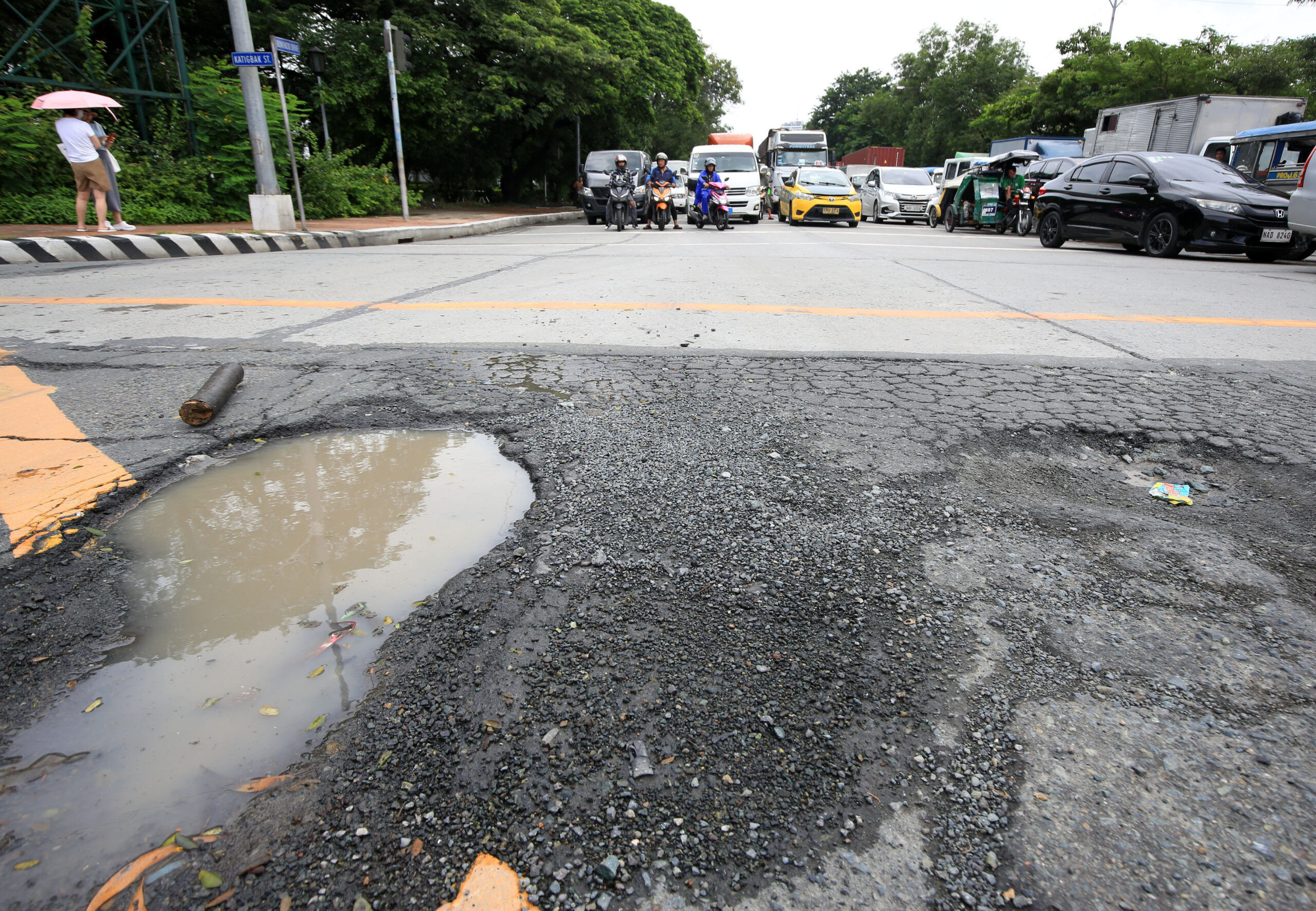
Static
By Marvin Tort

Typhoon Uwan came and went. And as I drove out on the first day of school after the long “weekend,” I couldn’t help but think that the potholes were actually winning. It’s the same story year in, year out: the rainy sea-son comes and goes, so do the repair crews. But the potholes, they keep coming back.
It’s the same story for us Filipino motorists, who pay registration fees annually on top of everything else government already collects from us. We’re told these fees, also known as the Motor Vehicle User’s Charge (MVUC), are earmarked for better and safer roads. And yet, the potholes keep winning.
It’s hard to shake off the feeling that we are just being taken for a ride — and on bad roads at that. I guess the joke’s on us. What’s not a laughing matter, though, is the amount of money collected from motorists eve-ry year, and how it doesn’t seem to end up where it should — on the road.
In 2019, Congress abolished the Road Board through RA 11239 and transferred MVUC administration to the Department of Public Works and Highways (DPWH) and the Department of Transportation (DoTr). The goal was simple: less corruption, less leakage, more efficient use of funds.
I bought into that spin and supported the abolition of the scandal-ridden Road Board, then plagued by allegations of corruption. RA 11239 took the MVUC, earmarked by law for road improvement, and gave the fund’s management to the implementing agencies. But even this “experiment” seems to be failing.
Six years into the “new” setup, it remains a mystery where the MVUC funds actually go. Why do we still see so many dangerous, poorly maintained roads if motorists have been paying a dedicated charge for decades? It doesn’t seem like the Road Board’s abolition did us any good.
MVUC collections — car registration fees — don’t go to the general fund. They are legally earmarked into four special trust accounts in the National Treasury: 80% for national roads maintained by the DPWH; 5% for local road maintenance; 7.5% for traffic management and road safety devices; and another 7.5% for vehicle pollution control programs under the DoTr.
As of end-2023, data indicate the balances in these trust accounts were still in the multi-billion-peso range. For 2025 alone, about P34 billion was appropriated under the Special Road Fund in the national budget. That’s the fund that goes to the DPWH for maintaining national roads. Yes, the DPWH.
It seems like billions of pesos are sitting in special accounts — thanks to ordinary motorists — instead of filling potholes, repainting lane markings, installing traffic lights, and making sure our roads are safe and accident-free. Money may not have been lost to corruption, but unless used properly, it is wasted just the same.
What makes all this more concerning is the fact that even as MVUC funds are underutilized if not idle, the government wants to collect more. There are bills pending in Congress to increase MVUC rates, to raise more money particu-larly for the modernization of public utility vehicles (PUV).
With large fund balances, slow disbursements, the DPWH’s history of ghost or poorly done projects, and gaps in transparency and accountability in the use of public funds, how can Congress even consider asking motorists to pay more? The government should first prove that it can properly spend what it already collects. Fix the structure and the process first.
In 2018, I looked at audit findings, congressional investigations, and media reports, and concluded that the Road Board had failed its original promise. That board had become a magnet for what the late Senator Miriam De-fensor Santiago referred to as “apocalyptic corruption.”
In 2019, RA 11239 abolished the Board and transferred its powers, assets, and staff to the DPWH and DoTr. It made sense to give the job to the very agencies responsible for building and maintaining roads and managing transport. Until it didn’t. Things didn’t get any better. The potholes keep winning.
For one, nobody really vets the road-related “projects” proposed and implemented by the DPWH and DoTr and paid for by the fund as disbursed by the Budget department. Neither is there effective monitoring of these projects’ status and their supposed benefits.
When the same agencies that design, prioritize, and implement road projects also dominate the use of a dedicated fund meant to pay for them, the system’s internal checks rely almost entirely on the executive branch. Without strong, independent, public oversight, even a legally earmarked fund can behave, in practice, like a discretionary pot.
Our experience with flood control projects under the DPWH clearly indicates the need to review the process and look for better ways. Not a return to the old Road Board, and not a continuation of the current setup with the DPWH and DoTr at the helm, but a new, better-designed body for MVUC and road safety.
The point of design is that when we earmark money for an important sector, we should not just park it under the dominant control of one national department. In this case, 80% of MVUC is for projects under the DPWH. We need a body and a mechanism that can bring multiple actors into the planning and allocation process. We should make users and affected sectors part of the process.
In the case of MVUC, we abolished a flawed national Road Board and then centralized planning, prioritization, and fund use around an opaque DPWH (and to a lesser extent DoTr) without creating a more credible, more representative replacement.
We can keep MVUC funds at the national level for now, but have planning and project identification run by a new inter-agency, multi-stakeholder body that includes not just the DPWH and DoTr, but also Budget and local governments, as well as transport sector experts, the private sector, and the academe, among others.
And Congress should not raise the MVUC, or any road users tax, until a new body and system are in place that will efficiently and effectively utilize existing MVUC funds for road improvement and road safety projects bene-fitting motorists, pedestrians, the commuting public, and all other road users.
This will entail Congress prioritizing the creation of a new Road Improvement and Safety Board over any increase in MVUC rates. It should have the DPWH and DoTr; people from LGUs for local road concerns; representatives from road users; representatives from logistics and transport operators; and independent experts from universities and research institutions with expertise on roads and transport. The more reps, the better.
In short, we need stakeholders who are not line agencies but who have a direct interest in road quality, safety, and evidence-based planning. They should be responsible for planning, prioritization, and approval of MVUC-funded programs and projects; setting criteria and performance indicators; and overseeing monitoring and evaluation. The DPWH, DoTr, and LGUs will implement.
We need to spread responsibility and accountability across agencies and sectors, and create a body where road safety advocates, researchers, and private sector users can engage the government on more equal footing when it comes to planning, prioritizing, and approving improvement and safety projects.
At this point, the DPWH and DoTr, together with an independent counterpart, should review all MVUC-funded projects since 2019 and check where the money went, what it bought, and what outcomes it delivered. Results should be reported to Congress and the public.
Then Congress can consider creating a statutory, inter-agency, multi-stakeholder body that plans, prioritizes, and approves MVUC-funded projects and programs; sets the criteria for allocations and publishes them; oversees monitoring and evaluation; and guides implementation by the DPWH, DoTr, and LGUs. Congress should also put on hold any rate increase until a new body and new safeguards are in place.
Only through a thorough review of MVUC-funded projects since 2019, coupled with legislative work to create a better governance structure, can the government regain the people’s trust. It should treat motorists not just as a revenue source but as stakeholders in building better and safer roads.
Only then will the potholes stop winning.
Marvin Tort is a former managing editor of BusinessWorld, and a former chairman of the Philippine Press Council matort@yahoo.com